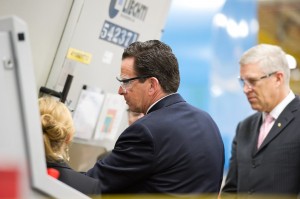Malloy treads tightrope

After Gov. Dannel P. Malloy ordered layoffs last week for more than 4,700 workers, some observers were questioning why Democrats rammed through a budget vote promising tax increases a month in advance of the statutory deadline, and two months before union contracts were set to expire.
The first week of May, Malloy trumpeted his signing of a budget despite having no agreement in place with the State Employees Bargaining Agent Coalition on retirement concessions that promise $1 billion in savings annually for the state ”“ but which SEBAC says amount to more than $20,000 in lost benefits per family.
At press deadline, SEBAC said it would continue negotiations in hopes of reaching a compromise with Malloy, who has already irked the business community with across-the-board tax increases, coupled with an overall increase in the state”™s budget.
One local business leader said several business owners have already said “they will be talking with their feet” ”“ an option obviously not realistic for the vast majority of local small-business owners who have local customers and connections and so require a local presence.
Business leaders already rated Connecticut the seventh worst place to do business in the nation, according to a poll released by Greenwich-based Chief Executive magazine. CEOs deem California and New York the worst states in which to run a business, followed by Illinois, New Jersey, Michigan and Massachusetts.
Bonnie Stewart, vice president of government affairs for the Connecticut Business and Industry Association, referenced Malloy”™s repeated promise to adopt policies that proclaim Connecticut “open for business,” in an analysis on the eve of the budget vote.
“Unfortunately the way the package was designed, it will hit most hard Connecticut”™s small businesses, because of changes to the personal income tax which is what most businesses pay their business taxes through,” Stewart said. “So much for being open for business.”
Malloy spent the spring arguing the opposite while mollifying businesses with vows to ease their regulatory burden and make it easier for them to obtain state assistance in expanding in Connecticut.
“It is not a time of celebration,” Malloy said, after signing the budget bill. “It is a time of preparation for creating the new state that we all believe we must be invested in, in creating ”“ a state that depends more on economic growth and its future and job creation than one that will tolerate, on an ongoing basis, the failures of our economy to respond and grow and to produce jobs.”
The Senate pushed the budget through by a single vote after a marathon session leading to a 3 a.m. vote, with some questioning whether Democrats feared they would lose that swing vote if delayed any longer.
Fairfield County state senators voting in favor of the budget ”“ and the higher taxes it promises for many businesses and residents ”“ included Bob Duff of Norwalk, Edwin Gomes of Bridgeport, Carlo Leone of Stamford and Anthony Musto of Trumbull.
Malloy attributed the speedy resolution and passage of the budget to a recognition by many legislative leaders to get moving on tackling some of the state”™s toughest problems ”“ particularly chipping away at billions of dollars in unfunded future payments for pension and health care benefits for retired state workers, to which Malloy pledged any future surpluses generated under the state”™s new budget and tax regimen.
“I think anyone”™s crystal ball on that particular issue is clouded,” Malloy said. “I”™m not unlike other folks ”“ I”™d love to reduce taxes in the future, but you know, what are you asking me? I can”™t read the future. What I can tell you is that we have tens of billions of dollars of obligations that are unfunded. We”™ve got to get to the point where we begin addressing that. We make a little progress in this budget.”